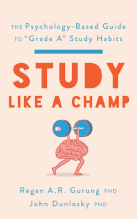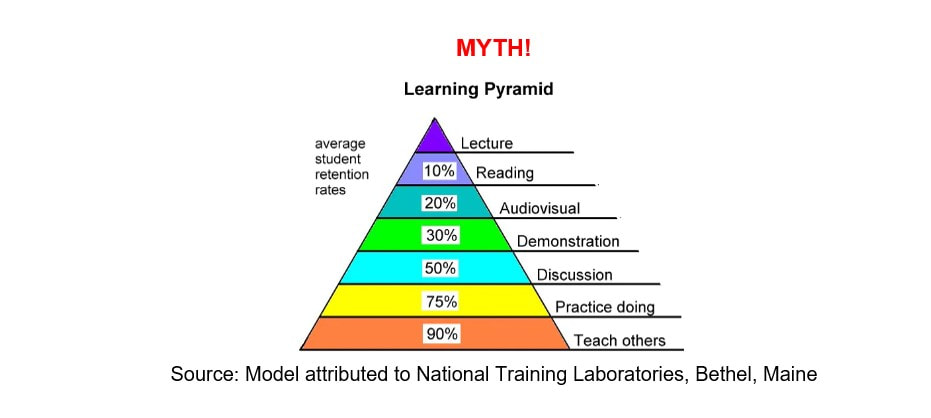Author: Regan A.R. Gurung and John Dunlosky
ISBN: 978-1-4338-4017-3
Gurung, R. A. R., & Dunlosky, J. (2023). Study like a champ: the psychology-based
guide to grade A study habits. American Psychological Association.
| open_your_class_study_champ.pdf |
This book is a must-read for high school and college students and educators alike. Study Like a Champ opens with a research-based answer to the frequent student question, “What do I need to do to get an A?” Written by psychology professors and longtime advocates for high school psychology. Regan A.R. Gurung, Ph.D., and John Dunlosky Ph.D. The book is packed with practical tips for studying smarter, not harder, and lays out a method for students to plan, monitor, and evaluate their learning for optimal success. The book debunks many firmly held myths about how to study commonly held by students and illustrates effective and empirically based methods for improving study habits and academic results. The authors also address commonly held teacher myths, including the learning pyramid that proposes the amount of learning by students is correlated with the instructional strategy used. Lecture is depicted as having the worst outcomes for student learning retention. This myth causes teachers to avoid lectures out of concern for decreased student learning. Like many methods, lectures can be effective or ineffective depending on the quality and topics discussed. The authors discuss how active learning, such as teaching others or discussion, can sometimes be successful but also how many versions of active learning, such as group work and problem-solving out loud, can harm learning.
Chapter one, titled, So You Think You Know How to Study? Let’s FoK About it, challenges students to evaluate their study habits to determine and compare them with evidence-based best practices. Fok, according to cognitive psychology, is a feeling of knowing that exists for any class, assignment, or topic and can be strong or weak. Unfortunately, cognitive science finds that FoKs are often inaccurate. Individuals can feel that they know something well and find out from an assessment that it was not the case or vice versa. This chapter has an excellent survey for students to evaluate their current study habits, Start Now: How Are Your Study Habits? The chapter then lays out in a compare/contrast style what helps learning based on research as opposed to what does not help learning based on research. The authors help students who use habits less supported by research improve those habits. Although highlighting and rereading (commonly used student study habits) do not support learning, even these habits can be improved. The authors suggest having students highlight strategically by indicating the areas they want to study more and following up on those areas using other methods. Rereading should not be a major strategy and works best if it is part of distributive study.
Subsequent chapters help students plan, monitor, and evaluate their learning and apply specific strategies to their classes and busy schedules. Important methods discussed in the book include self-assessments of metacognition, tools for utilizing class time, effective notetaking, spaced or distributive study, retrieval practice methods, interleaving, worked examples, and winning strategies for combining specific tactics. These practical methods are tied to supporting research, effective graphics, and student self-evaluations throughout each section.
The final chapter is an essential discussion of healthy behaviors and how to cope effectively with the rigorous course schedule and additional commitments modern students face. This book is an excellent tool for teachers that can be used to help students apply findings from psychological science to improve their learning.
Other Related Resources
Speaking of Psychology: American Psychological Association Podcast --
“How to Learn Better Using Psychology, with Regan Gurung, Ph.D., and John Dunlosky, Ph.D.”
Psych Sessions Podcast: Convos About Teaching N’ Stuff Gurung and Dunlosky: Study Like a Champ
Follow @studychamp22 on Instagram or TikTok — Practical science-based tips from the book to help students study more effectively. The feed includes many compelling graphics to use to highlight research on studying.https://www.instagram.com/studychamp22/https://www.tiktok.com/@studychamp22Inside the Mind of a
Master Procrastinator, TED Talk — Show students this engaging TED Talk by writer Tim Urban after they take the survey in the Open Your Class with This Today activity to get a sense of their current relationship to the topic. https://www.youtube.com/watch?v=arj7oStGLkU
Top 20 Principles for Pre-K to 12 Education
This booklet, produced by the American Psychological Association, clearly outlines the most effective methods for teaching and learning.
The Top 20 are categorized into five areas of psychological functioning:
Thinking and learning: How do students think and learn?
Motivation: What motivates students?
Social-emotional learning: Why are social context, interpersonal relations, and emotional well-being important to student learning?
Classroom management: How can classroom behavior best be managed?
Assessment: How can teachers effectively assess student progress?
Link to Top 20
Psychological Figures and Concepts
Hermann Ebbinghaus
John Hattie
William James
Walter Mischel
Avoidant coping
Blocked practice
Burnout
Conceptual knowledge
Cornell method
Cued recall
Distributed/spaced practice
Encoding
Emotion-focused coping
Flashcard plus method
Feeling of knowing (FoK)
Homeostasis
Hypothalamus
Interleaving
Key-word mnemonics
Massed practice
Matrix method
Meditation
Mental health
Meta-analysis
Method of loci
Mindfulness
Mindset (growth v. fixed)
Motivation
Multitasking
Overconfidence
Pomodoro method
Problem-focused coping
Procrastination
Retrieval practice
Rumination
Test-enhanced learning
Transfer tests


 RSS Feed
RSS Feed